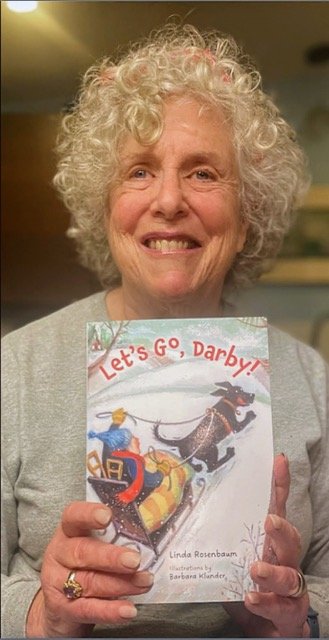New book reveals story of young Uxbridge boy - and his dog
Lisha Van Nieuwenhove with Linda Rosenbaum
Most people in Uxbridge - even those who have been here for a long time - have never heard of Georgie Titus. That will soon change, because a Toronto-based author accidentally discovered little Georgie’s story, and wrote a book about it.
“Let’s Go Darby” began when, in 2019, Linda Rosenbaum stumbled across a remarkable true story about a 10 year-old boy from Uxbridge.
“I was doing research on the history of SickKids Hospital in Toronto, and he was one of its earliest patients, in 1898,” explains Rosenbaum. “His name was Georgie Titus. I was so amazed by Georgie and what he did, that as a writer, I knew his story should be told. But how? I had so little to work with!”
Toronto author Linda Rosenbaum holds a copy of her latest work, “Let’s Go, Darby!”, a fictional story based on the true adventures of a 10-year old Uxbridge boy. Rosenbaum will be at Blue Heron Books in Uxbridge on Saturday, June 28, to talk more about the tale she accidentally uncovered. Submitted photo
Rosenbaum only had a smattering of information. According to Sick Kids: The Story of the Hospital for Sick Children, which was written in 1975, 10-year-old Georgie Titus from Uxbridge, Ontario, was “crippled” (a term no longer in use, but is used to categorize Georgie). Georgie had apparently heard about a new hospital in Toronto where they performed miracles and was desperate for an operation so he could walk.
Of particular interest to Rosenbaum was that even though Georgie couldn’t walk, he delivered newspapers to the Uxbridge townspeople by dogsled. On February 14, 1898, after his morning newspaper deliveries, Georgie took his dogsled 40 miles, on his own, to Toronto, and landed on the doorstep of The Hospital for Sick Children in Toronto.
After many months at the hospital and several operations (SPOILER ALERT) Georgie could walk.
“Amazing,” says Rosenbaum. “How, in 1898, could a “crippled” boy from Uxbridge possibly travel 65 km to Toronto on his own by dogsled? What an adventure he must have had. What bravery, courage, what determination! I wanted to tell Georgie’s story.”
Rosenbaum recalls that she had slim pickings to work with.
“I didn’t even know the name of Georgie’s dog or what breed it was. What was the name of the newspaper he delivered? What disability did Georgie really have? There wasn’t enough information to write a short story, let alone a book, which I had my sights on. If I wanted to write anything about Georgie, I’d need more.”
Rosenbaum’s first stop for more information was the Uxbridge Historical Centre. While staff there found Georgie’s birth, death and marriage certificate for Rosenbaum, they didn’t find anything more to fill out the story.
Rosenbaum says it then became obvious to her that she would need to turn Georgie’s story into fiction, which she still felt would be a challenge.
“Historical fiction needs to get every little detail right about the period it’s set in, and its sprit must reflect the zeitgeist of the time,” says Rosenbaum.
After spending months in the SickKids archives, Rosenbaum eventually learned what she needed to know. “Let’s Go, Darby!” became her book
of historical fiction for middle grade readers.
She says one of the biggest challenges, once she started writing, was figuring out how Georgie got to Toronto from Uxbridge by dogsled.
“It had to be believable, based on what was possible in 1898. No highways to follow, no GoTransit. No Durham Region Transit!”
After a bit of digging, Rosenbaum read that grain was delivered by train to the Gooderham and Worts Distillery in Toronto at that time for making whisky. She then had Georgie follow alongside the tracks. Was that how Georgie really got from Uxbridge to Toronto?
“I still don’t have a clue!” laughs Rosenbaum.
She said there were other details about Uxbridge at the end of the 19th century that she needed to know.
“I’m grateful to J. Peter Hvidsten for his book Uxbridge: The First One Hundred Years 1800-1900 for helping me answer questions like where might Georgie’s father have worked? The Uxbridge Piano and Organ Company. Where did his mother buy groceries? The Daley Brothers General Store. And what was the name of the newspaper that Georgie delivered every morning in 1898? The Uxbridge Journal.
“These are the kind of details that bring colour and realism to historical fiction,” says Rosenbaum.
The book tells the story of Georgie Titus, who has what is commonly called “clubfoot.” He is unable to walk and gets bullied by kids at school. After his monumental journey to the hospital, a number of other adventures - and friends - await Georgie.
"I think a lot of kids who are ill or have disabilities will relate to it, but what I'm finding is that adults are really enjoying it too because there's so much Toronto history in it," said Rosenbaum in an interview with the CBC back in April. Rosenbaum herself is the mother of a child with a disability, and currently lives on Toronto Island, on the site of SickKids Hospital’s former summer home.
Rosenbaum is bringing her experience with Georgie Titus and “Darby” to Blue Heron Books on Saturday, June 29, between 1 - 3 p.m. Presented by the Uxbridge-Scott Historical Society, Rosenbaum will talk about “Let’s Go, Darby!” and Uxbridge’s early days.

